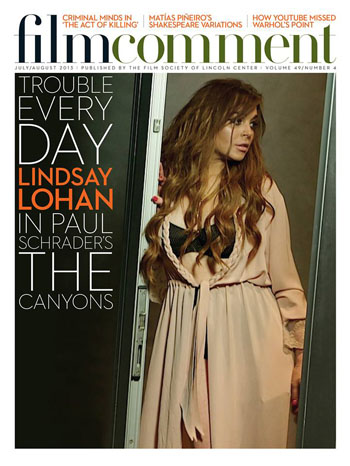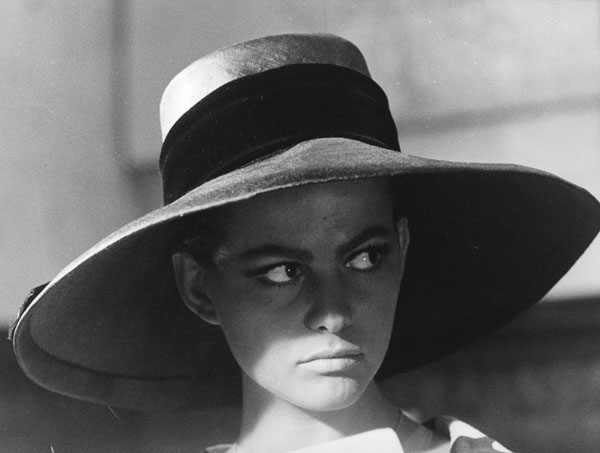It’s Paul Schrader Day once again, as the new July/August 2013 issue of Film Comment is out, with Lindsay Lohan on the cover, Schrader himself explaining that casting her in The Canyons was worth all the trouble, and Larry Gross arguing that Schrader’s latest is “is a compelling, twisted film about sex, career, money, and power in contemporary Hollywood. But the story, while edgy and intricate with deceit and betrayal, is a means to another end. Paul Schrader’s new movie paints a convincing picture of this cultural moment, a post-economic-crash digital age in which anyone driving a fancy car and flashing a credit card may or may not be an ‘indie’ film producer, and sexual and professional commitments are as fragile and ephemeral as sea breezes.” Gross’s interview with the filmmaker follows; and then, further in, Bret Easton Ellis, who wrote the movie, fesses up to half a dozen “guilty pleasures.”
Also in this new issue, among many other features (and the online offerings this time around are quite generous): Stuart Klawans on The Act of Killing, Violet Lucca on Letterboxd, “the best new way for cinephiles to get into online arguments with their friends,” Howard Hampton on King Vidor‘s Beyond the Forest (1949) with Bette Davis, Chuck Stephens on Wanda Hendrix, reports from Cannes by Amy Taubin, Kent Jones, Gavin Smith, and Dennis Lim, Manuel Yáñez-Murillo on a new box set of the complete works of Pere Portabella from the Spanish DVD label Intermedio (“Each movie offers an example of Portabella’s hybrid approach, in order to elaborate a sensorial, lucid, and occasionally cryptic reflection on its own materiality”), Steve Erickson on Johnnie To‘s Drug War, and again, Kent Jones, here on Computer Chess: “[Andrew] Bujalski is one sharp filmmaker, cultivating the appearance of random behavior while adhering to structures that appear to grow organically from the shooting…. Computer Chess has been mistaken for one kind of movie—a narrative about an introverted young man named Peter Bishton (Patrick Reister) enjoying an awkward coming-of-age experience—when it is, finally, a series of touchingly rhapsodic variations on communion and aloneness, desire and repression, control and chaos.”
Meantime, in New York, Bujalski talks about “the movies, books, TV shows, albums, and European countries that shaped his work.”
“In the 1970s,” writes Ehsan Khoshbakht in the Notebook, Alain Resnais “published a collection of his photographs, taken between 1948 to 1971, in the country of his residence, France, as well as places in which he wanted to make films, among them England (for a film project based on Harry Dickson stories), the United States, and Hiroshima in Japan.” He shows us ten of these and notes: “What is so fascinating about these photographs is their deep relation with Resnais’s films, especially in the way in which the nature of photographic image is rejected, or as the Iranian-French philosopher Youssef Ishaghpour has observed, Resnais’s refusal to work with the camera as an instrument for the representation of reality, but as ‘the best means to approaching the working of the mind.'”
In other news. The Venice International Film Festival, celebrating its 70th anniversary edition from August 28 through September 7, has announced that “Claudia Cardinale will be the guest host of Venezia Classici, the section devoted to restored films and to documentaries about cinema.” Cardinale will also attend the screening of a newly restored print of Luchino Visconti‘s Sandra (Vaghe stelle dell’Orsa, 1965), in which she stars. Also lined up are restorations of films by Roberto Rossellini, Jean Renoir, Satyajit Ray, Yasujiro Ozu, Alain Resnais, Chantal Akerman, Nagisa Oshima, Aleksey Guerman, Elio Petri, John Ford, and William Friedkin, recipient of the Golden Lion for Lifetime Achievement.
Terry Gilliam’s told the Italian site Mister Movie that his latest film, The Zero Theorem, with Christoph Waltz, David Thewlis, Tilda Swinton, Peter Stormare, Matt Damon, and Ben Whishaw, will be competing in Venice, reports the Playlist‘s Kevin Jagernauth. What’s more, “the site also claims that an anonymous source has tipped them that the rather under-the-radar, Jessica Chastain and James McAvoy-starring, relationship drama double bill The Disappearance of Eleanor Rigby: His and The Disappearance of Eleanor Rigby: Hers will also play in competition.” That pair of films also features Viola Davis, Isabelle Huppert, Ciaran Hinds, and William Hurt.
London. “The BFI’s African Odysseys strand exploring the African roots in world cinema continues with an extremely rare screening of Herbert Danska’s Right On! (1970),” writes Ashley Clarke. “An exceptionally entertaining mixture of music, poetry and politics, Right On! offers a valuable window onto the era’s artistic representation of the Black Power movement, which reached its peak in the late 1960s and early 70s.” And a brief historical overview follows.
Zurich. There’s an Udo Kier retrospective on at Kino Xenix through August 28.
In the works. In 2011, Michel Houellebecq, “French literature’s perpetual enfant terrible,” as Angelique Chrisafis calls him in her report for the Guardian, disappeared for a while during a book tour, causing a minor sensation. “Now, in twist worthy of one of his books, a French production company has announced it has just finished shooting a feature film, L’ Enlèvement de Michel Houellebecq, or The Kidnapping of Michel Houellbecq, with the author playing the starring role.”
More browsing? See Mike Everleth and the Film Doctor.
For news and tips throughout the day every day, follow @KeyframeDaily on Twitter and/or the RSS feed. Get Keyframe Daily in your inbox by signing in at fandor.com/daily.





